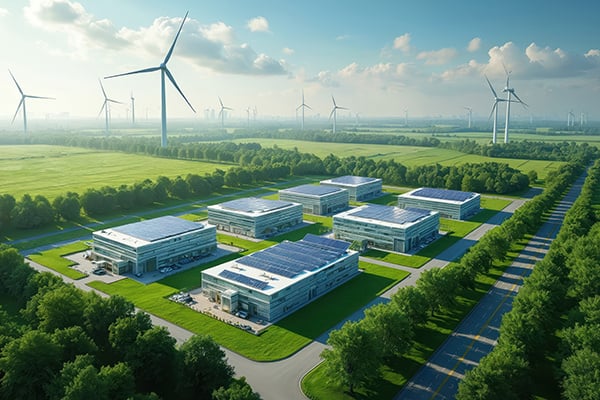
March 31, 2025
U.S. Data Center Construction Set for Significant Growth – Updated with latest Mid-Year Forecast
What is Fueling the Activity?
The data center industry in the United States is experiencing unprecedented growth. The updated mid-year forecast from the American Institute of Architects (AIA) 2025 Consensus Forecast of construction growth shows the data centers construction segment projected to grow by 33.7% in 2025 and another 19.5% in 2026.
FMI Corp, a building & construction consulting firm that contributes to the AIA Consensus Forecast, provides a longer, positive outlook for data center construction growth:
U.S. Data Center Construction Forecast – Q3 Forecast:
2025: $38B +32.0%
2026: $45B +19.0%
2027: $51B +15.0%
2028: $57B +11.0%
2029: $62B +9.0%
The activity is driven by a combination of technological advancements, increasing demand for digital services, and the need for robust infrastructure to support emerging trends. Here is an in-depth look at the key factors fueling this boom.
The Surge in Artificial Intelligence (AI)
AI technologies are becoming central to numerous industries, from healthcare to finance and retail. These technologies require immense computational power and storage capacity, which data centers are uniquely equipped to provide. The rise of generative AI tools, autonomous systems, and real-time analytics has intensified the demand for high-performance computing environments.
Data center construction spending, a subset of the office segment, is expected to grow 22% in 2025 and by more than 14% in 2026 – driven predominantly by emerging AI power generation demand. Business leader Kevin O'Leary identifies Texas; West Virginia; North Dakota; and Alberta, Canada, as key geographic growth markets due to available natural gas energy sources to fuel immediate needs.
Growth in Cloud Computing and Hybrid Models
Businesses continue to shift to cloud-based solutions to increase scalability, reduce costs, and enhance flexibility. However, many organizations are adopting hybrid cloud models — combining on-premises, private cloud, and public cloud solutions — to balance security and accessibility. This trend is driving the construction of more versatile data centers capable of supporting diverse workloads.
Expansion of 5G Networks
The widespread deployment of 5G technology is transforming connectivity by enabling faster speeds, lower latency, and greater device density. These advancements support the proliferation of Internet of Things (IoT) devices, smart cities, and edge computing. As a result, data centers are expanding to handle the increased traffic and data processing demands.
Rising Data Privacy and Security Concerns
With stricter regulations such as the California Consumer Privacy Act (CCPA) and General Data Protection Regulation (GDPR), organizations are prioritizing secure data storage and processing. Modern data centers are being designed with advanced security measures – including encryption, access controls, and real-time threat detection – to meet these compliance requirements.
Sustainability and Green Initiatives
Environmental concerns are shaping the future of the data center industry. Operators are investing in renewable energy sources, energy-efficient cooling technologies, and carbon-neutral certifications to reduce their environmental impact. The push for sustainable infrastructure aligns with corporate social responsibility goals and regulatory pressures, attracting more investment.
eCommerce and Digital Entertainment Growth
The explosion of e-commerce platforms and digital entertainment services, such as video streaming, online gaming, and virtual events, has significantly increased the demand for low-latency and high-bandwidth data centers. These sectors rely heavily on robust infrastructure to deliver seamless user experiences.
According to Fortune Business Insights, the global online entertainment market is expected to grow from $111.30 billion in 2025 to $261.23 billion by 2032.
Edge Computing and Decentralization
Edge computing, which brings data processing closer to the source of data generation, is gaining traction in 2025. This approach reduces latency and enhances performance for applications like autonomous vehicles, remote healthcare, and augmented reality. Data centers are adapting by deploying smaller, localized facilities alongside traditional centralized hubs.
Federal and State Incentives
Government initiatives and tax incentives are encouraging data center construction in specific regions. States like Virginia, Texas, and Arizona are emerging as data center hubs due to favorable policies, access to renewable energy, and lower operational costs. This has spurred investment and accelerated growth in the sector.
The anticipated rapid growth of data centers in the U.S. in 2025 is a testament to the evolving digital landscape and the increasing reliance on technology across industries. By embracing innovation, sustainability, and security, the data center industry is poised to support the demands of a connected world while driving economic growth and technological progress.
Let’s talk.
Have a specific marketing challenge? Looking for a new agency?
We’d love to hear from you.